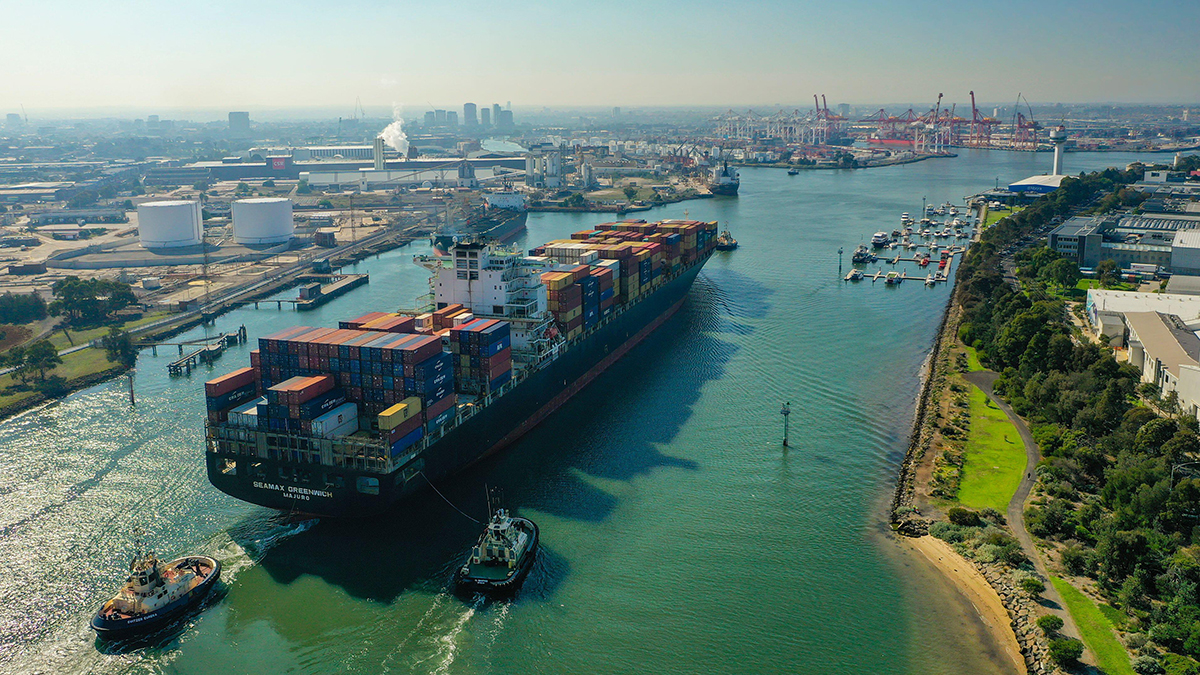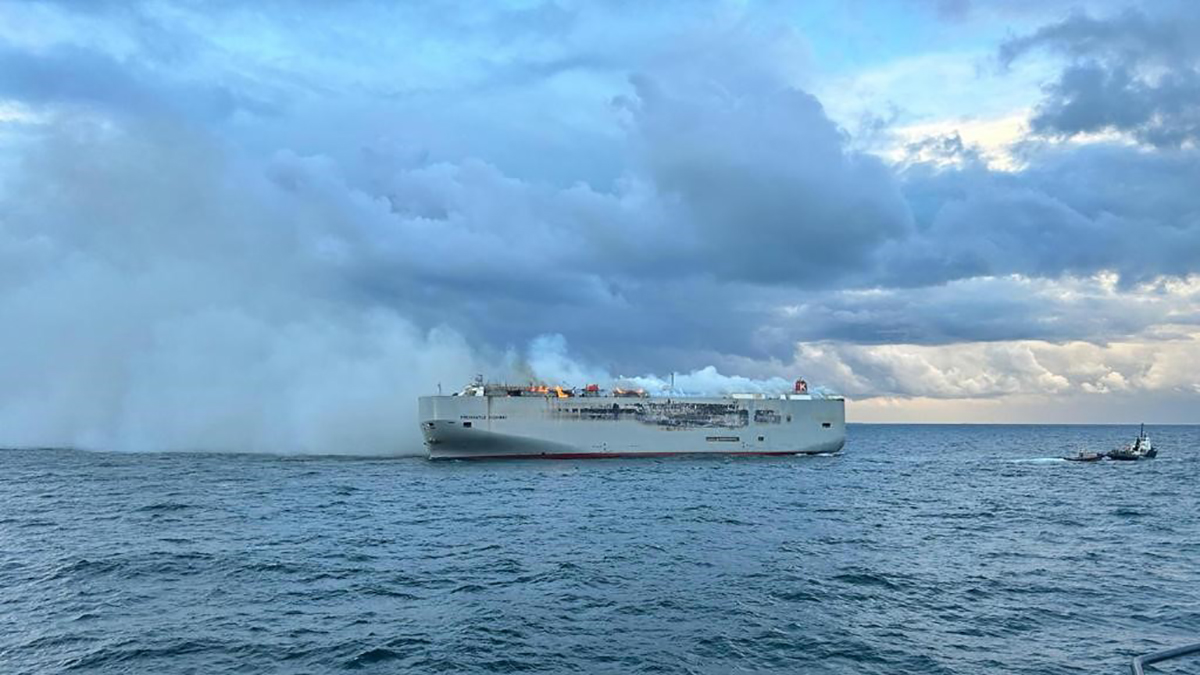Marine insurers must offer support with emerging risks: Iumi’s Denèfle
‘As the world’s oldest insurance business, our sector has demonstrated its ability to flex to new needs and conditions, both market and macroeconomic,’ president of the International Union of Marine Insurance, Frédéric Denèfle, says
Iumi president, Frédéric Denèfle, describes the environmental and economic tests the marine insurance market must pass
The president of the International Union of Marine Insurance (Iumi), Frédéric Denèfle, highlighted “strength and stability in turbulent seas” in his opening address to delegates at Iumi’s annual conference held in Edinburgh in September.
Discussing current turbulence, Denèfle defined what is “business as usual” for marine underwriters.
“We are used to managing an array of casualties and losses onboard a variety of vessels and in ports and other shoreside facilities. Dealing with the fallout from natural catastrophes such as earthquakes and weather events are also workaday issues. Similarly, operating among geopolitical chaos is an ongoing problem we face but this has been exacerbated recently with the war in Ukraine,” he said.
“On top of the geopolitical situation, which impacts international trade, there are regular risks to our activity. This includes the quality of crews, technological shifts and the influence of new regulation to decarbonise shipping as much as possible”
Frédéric Denèfle
International Union of Marine Insurance
“Marine insurers actively supported the creation of the original grain corridor to ensure Ukrainian exports could still continue. Now that agreement has broken down, marine insurers are in discussions with the Ukrainian government to provide cover for the vessels moving Ukrainian cargoes,” he added.
Denèfle also said fragmentation in trade, with the Covid pandemic having revealed a range of strategic dependencies, has led to a general reduction in global demand and encouraged a relocation of activity closer to the consumer. On the legal side, he continued, shipping and insurance are being targeted with increased sanctions as well as local green regulations where, for example, some jurisdictions will not register vessels above a certain age.
A consequence of inflation, caused by the pandemic and the war in Ukraine, was already manifesting itself, he said, in the increased cost of claims, the requirement to take on more risk as asset values increase and a related need for more capacity in the market.
Added to this, a general technological shift in terms of clean energy, clean propulsion and autonomous vessels is creating more “turbulence”, he said, but all new technologies and climate change reduction measures are “to be welcomed”.
Although the marine insurance market is “in a state of flux”, Denèfle said he is confident in its ability to cope: “As the world’s oldest insurance business, our sector has demonstrated its ability to flex to new needs and conditions, both market and macroeconomic.”
He predicted a return to dedicated, experienced teams; a heightened reliance on intelligence and data systems to anticipate the consequences of geopolitical uncertainty; the emergence of local teams underwriting local business in their own areas to challenge fragmentation; an adjustment of market capacities and pricing to fight inflation pressures; and the creation of specialist teams to fully understand the implications of new technologies. “Of course, much of this is already happening,” he stressed.
Beyond the headlines
Marine insurance has continued the healthy growth seen in the past three years, with premiums jumping 8.3% in 2022 to reach $35.8bn. The big picture is characterised by a consistent upward trend across all classes since 2019, regardless of the pandemic.
In combination with a benign claims impact, this has translated into a much better performance in terms of loss ratios, specifically for hull and cargo. Of the four main classes, transport and cargo remains the biggest line, accounting for 57.3% of the book. Hull makes up 23.4% of premiums, followed by offshore and energy on 11.5% and non-International Group liability cover on 7.7%.
Another headline that emerged from the Iumi conference was protection and indemnity clubs are publishing combined ratios of below 100% for the first time since the late 2010s.
In an interview with Insurance Day, Denèfle says it is important to look beyond these numbers and to emerging risks. “These numbers are positive and encouraging for any one of us who has invested into the underwriting or the support of marine insurance, but we have to consider what is ahead of us in terms of the situation we are going to face,” Denèfle says.
The first challenge he highlights is changes to international trade patterns. “Transport is heavily influenced by the geopolitical situation. The war between Russia and Ukraine is, of course, an important piece of that, but we’re also considering the various approaches taken by large states, such as the US and China, and by regional organisations, like the EU, in relation to controlling their international trade,” Denèfle says.
This is linked to the sanctions and embargoes that have been decided and imposed, which now number as many as 3,000, he continues, citing the International Monetary Fund.
“On top of this geopolitical situation, which impacts international trade, there are regular risks to our activity. This includes the quality of crews, technological shifts and the influence of new regulation to decarbonise shipping as much as possible. We are heading towards new fuels, new machinery and new equipment onboard vessels. These are evolutions that will impact the risks we insure,” he says.
Electric vehicles
There are growing concerns within the shipping community, including among marine underwriters, about fires breaking out on car carriers and roll-on/roll-off vessels, with the assertion many of these fires are attributable to electric vehicles (EVs).
In response, Iumi researched these claims and published recommendations on the safe carriage of EVs. This research showed fires in battery EVs are not more dangerous than fires in conventional vehicles nor are they more frequent.
Understanding the potential risks from lithium-ion batteries is, however, “work in progress”, Denèfle says.
“All kinds of batteries are being built all around the world and this will certainly increase. We must ensure insurers understand from one battery to another, from one use to another, from one situation to another, there are some specific loss prevention measures that have to be considered. This must be a case-by-case analysis each insurance company has to consider in its risk assessment process. Iumi’s role here is to remind insurers e-batteries are classed as dangerous goods, which needs to be factored into their risk analysis.”
Could there be a reaction to this advice that sees insurers simply exclude e-batteries from policies?
“I can’t see that we would have a general market approach to exclude them. What we are facing is a regular type of risk linked to the fact those fires are difficult to manage. Certainly, what will happen is marine insurers will consider some specific loss prevention measures going together with their insurance contracts. Some marine insurers may consider specific deductibles, to make sure there is a good apportionment of the risk between the insured and the insurance company,” Denèfle says.
Iumi urges its members and public not to fall into the trap of automatically blaming EVs for fires onboard vessels, because that risk has not yet been proven.
“When it comes to saying e-batteries cause fires, don’t go in that direction because there is no one who can demonstrate that. We can trust e-batteries, but we have to acknowledge whenever there is a fire involving them, it’s much more difficult to extinguish. That’s for sure,” he says.
ESG and decarbonisation
The chief executive of French war risk underwriter Garex, Denèfle was appointed Iumi president in September 2022. He picked up the baton from Richard Turner, including Turner’s work on environmental, social and governance (ESG) policy.
“Iumi’s ESG group has a constant watch on what marine insurers are doing to meet ESG targets,” Denèfle says. “As marine insurers, we have to make sure the activity of the community of insureds we protect should be as harmless as possible towards the environment. We also need to ensure diversity in the people with whom we work. For this, we must welcome a new professional profile – by gender and also geography. This is crucial to how we see the evolution of our personnel.”
Iumi does not set ESG targets for its members, he continues. Instead, it focuses on transparent messaging. “It’s more about having clear statements on how important these principles on diversity and sustainability are,” Denèfle stresses.
He underscores the importance of the Poseidon Principles for Marine Insurance, a global framework for assessing climate alignments of insurers’ hull and machinery portfolios. The Poseidon Principles use the decarbonisation ambitions of the International Maritime Organization (IMO) and the Paris Agreement as benchmarks.
Iumi regards the IMO’s recent strengthening of its greenhouse gas (GHG) emissions reduction goals as heralding a significant turning point for the shipping industry and, consequently, a heightened impact on marine insurers.
The IMO’s new targets are net-zero emissions by “close to 2050”, with a 20% to 30% reduction by 2030 and a 70% to 80% reduction by 2040 – from the 2008 baseline.
To achieve this, Denèfle told delegates at Iumi’s annual conference the industry will need to adopt a series of immediate measures followed by intermediate technologies and, finally, a long-term technology shift. “It’s gratifying to see leading shipowners, supported by charterers, have already made the first steps with some trail-blazing their way to early decarbonisation,” he said.
Maersk, for example, is investing in green methanol. “They’re putting their money into this because they own the vessels and want to adapt as much as possible to the shipping green evolution. Insurers are not part of that decision-making process because they do not have the means to influence investors,” Denèfle tells Insurance Day. “Where they can have influence is in finding ways to insure new fuels and technology, to support shipowners and car exporters in following ESG principles.”
The transition process has already begun with a rapid move to the digitalisation of the supply chain to introduce operational efficiencies, together with the introduction of a variety of onboard energy-saving devices, such as route optimisation and propellor/hull energy-saving innovations.
Temporary measures
As an interim solution, Denèfle says some shipowners are adopting liquefied natural gas dual-fuel, biofuels and wind-assisted propulsion. Longer-term, zero-emission propulsion options might include ammonia, hydrogen or methanol. Each of these new technologies would give rise to a new set of risks marine underwriters will need to insure, he stresses, and as the transition proceeds, retrofits will give way to newbuilds, again giving rise to new types of risks.
“With new innovations and a changing risk profile, the need for enhanced information becomes paramount,” Denèfle says, adding it will be important for underwriters to receive and analyse data on ESG, economic and technical performance.
“In the past, we had relied on historical information and statistics but today real-time, dynamic data such as weather, geopolitical, regulatory, routing and engine information are all available to us. We need to capitalise on this, as some underwriters are already doing, to ensure our cover remains relevant,” he says. “Predictive risk management and improvement to risk quality will, inevitably, lead to greater sustainability and profitability of our sector.”
“By using renewable electricity in harbour facilities, you can increase the energy efficiency of those vessels connected to the grid. That’s certainly a point on which shipping as a whole can improve the overall environmental situation”
Frédéric Denèfle
International Union of Marine Insurance
Renewables will be “extremely important” as a source of electricity for the marine sector, Denèfle says, “for at least one phase of shipping activity” – when vessels call into port and are connected to the local power grid.
“By using renewable electricity in harbour facilities, you can increase the energy efficiency of those vessels connected to the grid. That’s certainly a point on which shipping as a whole can improve the overall environmental situation – the less you use fossil fuels for machinery onboard a vessel, the greater the emissions reduction will be,” he says.
“That’s not to say it is the full solution, because vessels are not yet in a situation where they could use electricity from renewables on a large scale and in a way that enables them to navigate. There are some prototypes in Norway, where vessels have engines fully charged with electricity from huge batteries onboard. Before new fuels, such as ammonia, are developed to the point where they can be deployed on a large scale, the efficiency that should drive each and every shipowner is using renewable electricity onshore, wherever it’s available to them.”
Decarbonising shipping
There are two approaches to the decarbonisation of shipping that are already under way, Denèfle says.
“There are two types of shipowner: the ones who are able to invest in new technology and new designs of vessels, and the ones who are not able to invest right away but are taking measures to improve the energy efficiency of their vessels. That second way is certainly a quick win. Iumi is interested in understanding the progress shipowners are making and seeing what support they need,” he says.
An example of such support, he adds, is how marine insurers are working out the risks associated with vessels calling into ports to use technology designed for improved energy efficiency and how this could also contribute to the reduction of emissions.
Denèfle concludes: “For the marine insurance community, it is vital we maintain pace with all the incoming changes and innovations so we fully understand each and every risk involved, enabling us to support shipowners to derisk their new operations. This will include ensuring the continued safety of our crews at sea, their training and their wellbeing, as well as the safety of the vessels themselves and their cargoes.”



